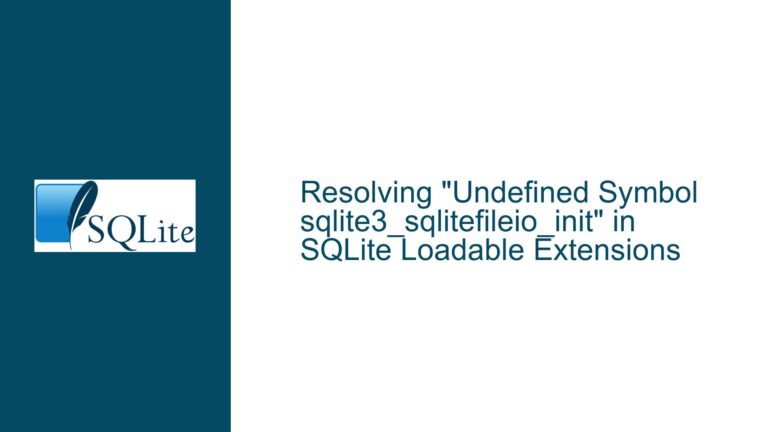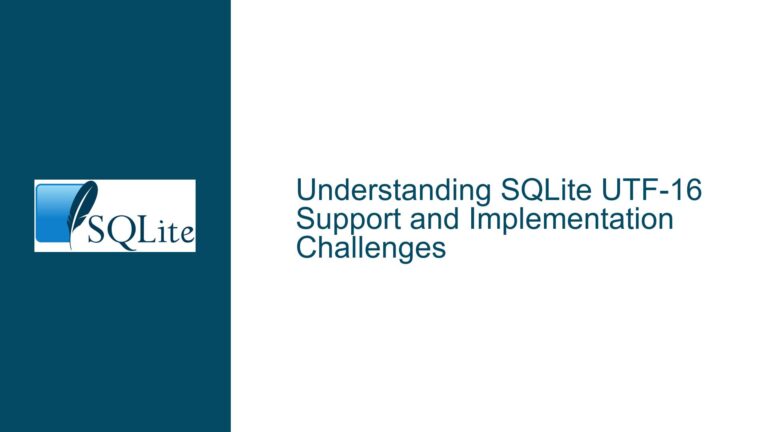SQLite Database Locking Issue in C++ Application
SQLite Database Locked by Unfinalized Prepared Statements
The core issue revolves around a C++ application that interacts with an SQLite database, where one function locks the database, preventing other functions from performing write operations. Specifically, the find_user function prepares a SQL statement to check if a user exists in the database but fails to finalize the prepared statement before returning. This oversight leaves the database in a locked state, causing subsequent write operations, such as those in the connect_user function, to fail with the error message: "database table is locked: UTENTE."
The find_user function opens the database, prepares a SQL statement to count the number of users with a specific username, and steps through the result. However, it does not call sqlite3_finalize to release the prepared statement or sqlite3_close to close the database connection. As a result, the database remains locked, and any attempt to modify the database, such as updating the Online status of a user in the connect_user function, is blocked.
This issue is particularly perplexing because the application is single-threaded, eliminating the possibility of concurrency-related locking. The problem lies entirely in the improper handling of SQLite resources within the find_user function.
Unfinalized Prepared Statements and Open Database Connections
The primary cause of the database locking issue is the failure to finalize the prepared statement in the find_user function. When a prepared statement is created using sqlite3_prepare_v2, SQLite allocates resources and may lock the database to ensure data consistency during the operation. If the prepared statement is not finalized using sqlite3_finalize, these resources are not released, and the database lock persists.
Additionally, the find_user function opens the database using a custom database_open function but does not explicitly close it before returning. While the database_close function is called in the connect_user function, the open connection in find_user remains active, contributing to the locked state. SQLite uses a file-based locking mechanism to manage concurrent access, and an open connection with an unfinalized statement can prevent other operations from acquiring the necessary locks.
Another contributing factor is the use of string concatenation to construct SQL queries, which can lead to SQL injection vulnerabilities and other issues. While this does not directly cause the locking problem, it is a poor practice that can complicate debugging and maintenance.
Finalizing Prepared Statements and Proper Resource Management
To resolve the database locking issue, the find_user function must be modified to properly finalize the prepared statement and close the database connection before returning. Here is the corrected version of the find_user function:
bool find_user(const std::string& user) {
sqlite3* db = database_open("UTENTE.db");
sqlite3_stmt* statement;
std::string query = "SELECT COUNT(*) FROM UTENTE WHERE Username = ?;";
bool user_exists = false;
if (sqlite3_prepare_v2(db, query.c_str(), -1, &statement, 0) == SQLITE_OK) {
sqlite3_bind_text(statement, 1, user.c_str(), -1, SQLITE_STATIC);
if (sqlite3_step(statement) == SQLITE_ROW) {
if (sqlite3_column_int(statement, 0) > 0) {
user_exists = true;
} else {
std::cout << "User:" << user << "doesn't exist" << std::endl;
}
}
sqlite3_finalize(statement);
} else {
std::cerr << "Failed to prepare statement: " << sqlite3_errmsg(db) << std::endl;
}
database_close(db);
return user_exists;
}
In this corrected version, the sqlite3_finalize function is called to release the prepared statement, and the database_close function is called to close the database connection. Additionally, the SQL query is parameterized to prevent SQL injection and improve readability.
To further enhance the robustness of the application, consider implementing the following best practices:
Use RAII (Resource Acquisition Is Initialization) Principles: Encapsulate database connections and prepared statements in classes that automatically manage their lifetimes. For example, create a
DatabaseConnectionclass that opens the database in its constructor and closes it in its destructor. Similarly, create aPreparedStatementclass that finalizes the statement in its destructor.Enable SQLite’s Write-Ahead Logging (WAL) Mode: WAL mode can improve concurrency and reduce locking issues by allowing reads and writes to occur simultaneously. Enable WAL mode by executing the following SQL command:
PRAGMA journal_mode=WAL;.Implement Error Handling and Logging: Add comprehensive error handling and logging to detect and diagnose issues quickly. For example, log errors and warnings to a file or console, and use SQLite’s error codes and messages to provide detailed feedback.
Use Transactions for Atomic Operations: Wrap related database operations in transactions to ensure atomicity and consistency. For example, use
BEGIN TRANSACTIONandCOMMITto group multiple updates into a single atomic operation.Avoid String Concatenation for SQL Queries: Always use parameterized queries to prevent SQL injection and improve performance. SQLite’s
sqlite3_bind_*functions allow you to safely bind parameters to prepared statements.
By following these steps and best practices, you can prevent database locking issues, improve the reliability and security of your application, and ensure proper resource management. Properly finalizing prepared statements and closing database connections are critical to maintaining the integrity and performance of SQLite databases in C++ applications.






